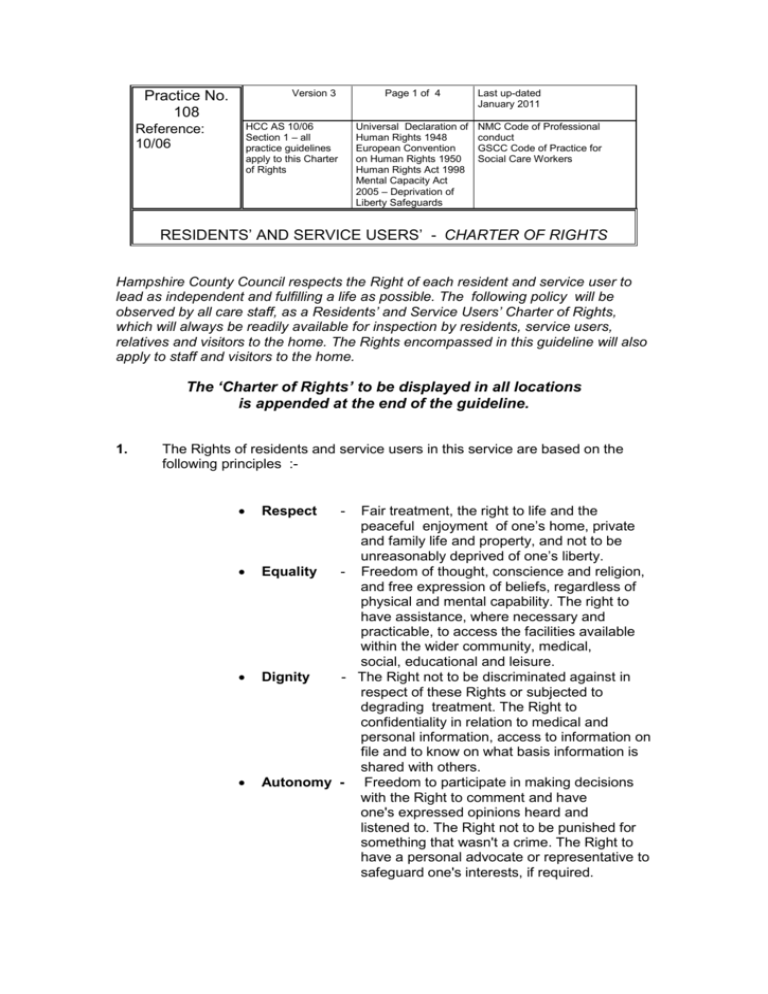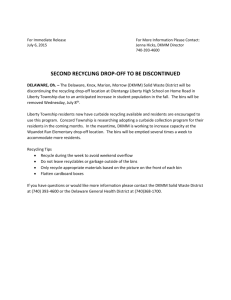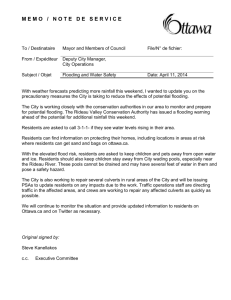Residents and service users` - Charter of rights 56kb
advertisement

Version 3 Practice No. 108 Page 1 of 4 HCC AS 10/06 Section 1 – all practice guidelines apply to this Charter of Rights Reference: 10/06 Universal Declaration of Human Rights 1948 European Convention on Human Rights 1950 Human Rights Act 1998 Mental Capacity Act 2005 – Deprivation of Liberty Safeguards Last up-dated January 2011 NMC Code of Professional conduct GSCC Code of Practice for Social Care Workers RESIDENTS’ AND SERVICE USERS’ - CHARTER OF RIGHTS Hampshire County Council respects the Right of each resident and service user to lead as independent and fulfilling a life as possible. The following policy will be observed by all care staff, as a Residents’ and Service Users’ Charter of Rights, which will always be readily available for inspection by residents, service users, relatives and visitors to the home. The Rights encompassed in this guideline will also apply to staff and visitors to the home. The ‘Charter of Rights’ to be displayed in all locations is appended at the end of the guideline. 1. The Rights of residents and service users in this service are based on the following principles : Respect - Fair treatment, the right to life and the peaceful enjoyment of one’s home, private and family life and property, and not to be unreasonably deprived of one’s liberty. Equality - Freedom of thought, conscience and religion, and free expression of beliefs, regardless of physical and mental capability. The right to have assistance, where necessary and practicable, to access the facilities available within the wider community, medical, social, educational and leisure. Dignity - The Right not to be discriminated against in respect of these Rights or subjected to degrading treatment. The Right to confidentiality in relation to medical and personal information, access to information on file and to know on what basis information is shared with others. Autonomy - Freedom to participate in making decisions with the Right to comment and have one's expressed opinions heard and listened to. The Right not to be punished for something that wasn't a crime. The Right to have a personal advocate or representative to safeguard one's interests, if required. 2. Types of Rights When caring for individuals with varying physical and mental capabilities, there will be occasions when there is a dilemma for the carer, between maintaining the Rights of the individual and providing care which is believed to be essential. In such situations, the type of Right must be considered and objectively presented to the person concerned and/or their advocate. Rights may be :2.1 Absolute Absolute Rights cannot be limited or interfered with in any way, by any organizations or public authority. An example of an absolute Right that may apply in a care setting, is the right not to be treated in an inhuman or degrading way. e.g. Being subjected to invasive procedures without consent. 2.2 Limited Limited Rights will only apply in specific and finite (time limited) circumstances. An example of a limited Right that may apply in a care setting is the Right to liberty. In residential care, an individual may only be deprived of liberty in accordance with the principles of the Mental Capacity Act 2005 – Deprivation of Liberty Safeguards. e.g. Locking of doors and use of bed rails. 2.3 Qualified Qualified Rights can be limited in a wider range of circumstances than limited Rights and are the majority of the Rights specified in the Human Rights Act. This is because the protection of qualified Rights can affect the Rights of others. e.g., someone’s Right to freedom of expression may compete with another’s Right to respect and dignity. HCC Adult Services may take action that interferes with these rights when a number of general conditions are met BUT any interference with a qualified Right must be in pursuit of a legitimate aim that is set out in the Human Rights Act, e.g. to protect the Rights of others or for the protection of health of the individual or others. References : Universal Declaration of Human Rights 1948 European Convention on Human Rights 1950 Human Rights Act 1998 http://www.dh.gov.uk/en/Publicationsandstatistics/Publications/PublicationsPolicyAnd Guidance/DH_088970 • Name of Home Residents’ Charter of Rights (Residential, Nursing and Day Care Practice Manual: 108) All Residents of this home have the Right : 1. To retain their personal dignity, choice and independence, irrespective of their physical or mental capability 2. To have their personal privacy respected in all aspects of their personal care and daily living, at all times 3. To be able to express their social, emotional, religious, cultural and political needs and to have them accepted and respected 4. To have skilled, sensitive and understanding care and support to enable them to aspire to, and achieve, the highest possible quality of life 5. To be involved in, and to be kept informed about, their individual assessment of need 6. To be involved in the development and implementation of their Plan of Care 7. To be consulted about personal and communal daily living arrangements in the home, and to participate in discussions about proposed changes to these arrangements 8. To have a regular review of their individual circumstances, and to have the right to be present and/or represented at any review meetings 9. To choose their own Medical Practitioner and Dentist, and to consult with them in private 10. To have access to hearing and sight tests and appropriate aids, according to need and to have access to those NHS services to which they are entitled 11. To have access to specialist medical, nursing, dental, pharmaceutical, chiropody and therapeutic services and care from hospitals and community health services and other appropriate external agencies 12. To manage their own personal affairs, including finances 13. To be kept informed of all the services offered by the home 14. Not to be moved without prior consultation 15. To have access to the formal complaints procedure 16. To be given the opportunity to vote in local and general elections The only limitation or qualification of these Rights will be in accordance with the legal and regulatory requirements necessary to protect the health and safety of the individual, other residents, visitors and staff, and to ensure that the appropriate level of care can be provided • Equality Autonomyhttp://www.dh.gov.uk/en/Publicationsandstatistics/Publications/Public ationsPolicyAndGuidance/DH_088970http://www.dh.gov.uk/en/Publicationsand statistics/Publications/PublicationsPolicyAndGuidance/DH_088970Ref








